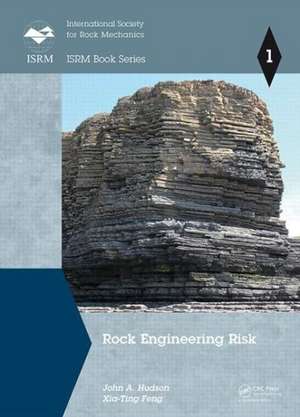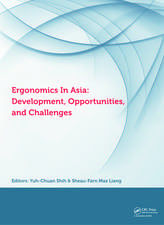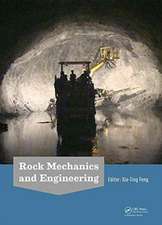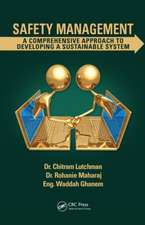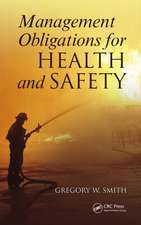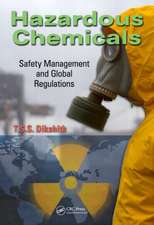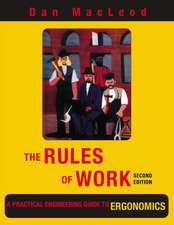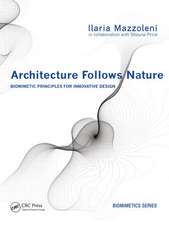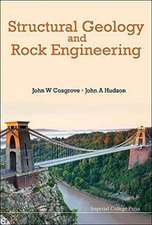Rock Engineering Risk: ISRM Book Series
Autor John A. Hudson, Xia-Ting Fengen Limba Engleză Hardback – 5 mai 2015
Written by two eminent authors, the two most recent past-Presidents of the International Society for Rock Mechanics (ISRM), this modern and well-illustrated guide on Rock Engineering Risk complements the authors’ previous 2011 book on Rock Engineering Design, also published by Taylor & Francis. The book will benefit engineers, contractors, clients, researchers, lecturers and advanced students who are concerned with rock engineering projects in civil, mining, geological and construction engineering worldwide.
Preț: 1134.44 lei
Preț vechi: 1383.46 lei
-18% Nou
Puncte Express: 1702
Preț estimativ în valută:
217.07€ • 227.25$ • 179.61£
217.07€ • 227.25$ • 179.61£
Carte tipărită la comandă
Livrare economică 05-19 aprilie
Preluare comenzi: 021 569.72.76
Specificații
ISBN-13: 9781138027015
ISBN-10: 1138027014
Pagini: 594
Ilustrații: illustrations
Dimensiuni: 174 x 246 x 38 mm
Greutate: 1.18 kg
Ediția:1
Editura: CRC Press
Colecția CRC Press
Seria ISRM Book Series
Locul publicării:Boca Raton, United States
ISBN-10: 1138027014
Pagini: 594
Ilustrații: illustrations
Dimensiuni: 174 x 246 x 38 mm
Greutate: 1.18 kg
Ediția:1
Editura: CRC Press
Colecția CRC Press
Seria ISRM Book Series
Locul publicării:Boca Raton, United States
Public țintă
Postgraduate and ProfessionalCuprins
Preface, Acknowledgements: International Society for Rock Mechanics, About the authors, 1 Introduction and background, 2 Uncertainty and risk, 3 Rock Engineering Systems (RES), auditing and Protocol Sheets, 4 Rock fractures and in situ rock stress, 5 Radioactive waste disposal: overcoming complexity and reducing risk, 6 Risks associated with long deep tunnels, 7 Risks associated with hydropower cavern groups, 8 Concluding remarks, Appendix A: Cavern risk events during construction, Appendix B: The Chinese ‘Basic Quality’ (BQ) system for rock mass classification, References and bibliography, Colour plates
Recenzii
This invaluable book reports the outcome of the work of the Commission on Design Methodology of the International Society for Rock Mechanics (ISRM) in the ISRM’s 2011-2015 term of office during which Professor John Hudson acted as Commission President while Professor Xia-Ting Feng served as ISRM President. It provides a sequel to the authors’ previous book, Rock Engineering Design (Feng and Hudson, 2011), which reported the work of the Commission in the ISRM’s 2007-2011 term of office when Professor Feng acted as Commission President and Professor Hudson served as ISRM President. […]
This book is extremely well written, easy to follow and well-presented on high quality paper. […] The publication of this book reinforces and adds to the already high reputation of the ISRM Commission on Design Methodology. It brings great credit to its authors, Professors John Hudson and Xia-Ting Feng; to the other members of the Commission on Design Methodology in the 2011-2015 period (their names are listed in the book’s Acknowledgements); to the staff of the Institute of Rock and Soil Mechanics, Chinese Academy of Sciences, Wuhan, China; to the ISRM itself; and to the publishers. The subject of the book is highly topical and is central to all modern rock engineering undertakings. The writer is pleased to be able to recommend this outstanding book unreservedly to all advanced students, researchers, teachers and practitioners in rock mechanics and rock engineering, particularly, but far from exclusively, those having an interest in underground excavations in rock. He believes that they will find the study this book to be as rewarding as he did.
E.T. Brown, Senior Consultant, Golder Associates Pty Ltd, Milton, QLD, Australia, quoted from the Journal of Rock Mechanics and Geotechnical Engineering 2012a; 4(1): III-IV (June 2015).
This book will apeal to rock engineers world-wide as it addresses generic rather than specific topics. The book covers the topic fully. John Hudson is one of the most highly regarded people in his field. I cannot think of two people in a better position to write this book.
John Cosgrove, Professor of Structural Geology, Imperial College, London.
This book is extremely well written, easy to follow and well-presented on high quality paper. […] The publication of this book reinforces and adds to the already high reputation of the ISRM Commission on Design Methodology. It brings great credit to its authors, Professors John Hudson and Xia-Ting Feng; to the other members of the Commission on Design Methodology in the 2011-2015 period (their names are listed in the book’s Acknowledgements); to the staff of the Institute of Rock and Soil Mechanics, Chinese Academy of Sciences, Wuhan, China; to the ISRM itself; and to the publishers. The subject of the book is highly topical and is central to all modern rock engineering undertakings. The writer is pleased to be able to recommend this outstanding book unreservedly to all advanced students, researchers, teachers and practitioners in rock mechanics and rock engineering, particularly, but far from exclusively, those having an interest in underground excavations in rock. He believes that they will find the study this book to be as rewarding as he did.
E.T. Brown, Senior Consultant, Golder Associates Pty Ltd, Milton, QLD, Australia, quoted from the Journal of Rock Mechanics and Geotechnical Engineering 2012a; 4(1): III-IV (June 2015).
This book will apeal to rock engineers world-wide as it addresses generic rather than specific topics. The book covers the topic fully. John Hudson is one of the most highly regarded people in his field. I cannot think of two people in a better position to write this book.
John Cosgrove, Professor of Structural Geology, Imperial College, London.
Descriere
This book provides a new, valuable approach to the consideration of risk in underground engineering projects constructed within rock masses. There are Chapters on uncertainty and risk, rock engineering systems, rock fractures and rock stress, the design of a repository for radioactive waste, plus two major case examples relating to the headrace tunnels and caverns for a hydroelectric project. The book is particularly timely given the current increasing emphasis on geo-engineering safety, accountability and sustainability. The book will benefit all who are concerned with rock engineering projects in civil, mining, geological and construction engineering worldwide.
